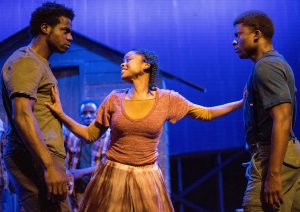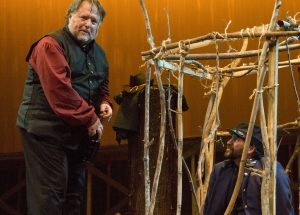Parks’ ‘Father’ a Conversation-Starter at Intrepid
Suzan-Lori Parks has been keenly interested in the U. S. Civil War as a watershed moment for African American male identity. Her 2002 Pulitzer Prize-winning play, Topdog/Underdog featured characters named Lincoln and Booth, even though the play was set in contemporary time. In Father Comes Home from the Wars (Parts 1, 2, & 3), Ms. Parks sets her story during the Civil War and continues her exploration of how African American men, in particular, were affected by it. It’s a complex, three-hour, work to unravel, and director Christy Yael-Cox and her Intrepid company do an admirable job with the unraveling.
As indicated in the title, Ms. Parks divides her play into three interlocking episodes. Part 1, “The Measure of a Man,” introduces the slaves on a West Texas ranch. The war is about to begin, and the master has told Hero (Wrekless Watson) that he will set Hero free if he takes care of the master for the duration of the conflict. It is a time for looking inward, as Hero will be leaving his love, Penny (Tamara McMillan). The Oldest Old Man (Antonio T.J. Johnson) is disturbed that Hero’s dog has run off, a bad luck sign. Also disturbed is Homer (Cortez L. Johnson), who has attributed the lost his foot to Hero’s prior indecision.
Part 2, “A Battle in the Wilderness,” shows Hero at war with his master, a colonel in the Rebel Army (Tom Stephenson). The Colonel has captured a Union soldier (Sean Yael-Cox), but the fighting is close and it is uncertain where the battle lines have been drawn.
Part 3, “A Union of My Confederate Parts,” returns the setting to the ranch. The war has nearly ended, and Hero, now named Ulysses, has returned to find that his dog (Durwood Murray) has returned, that a group of slaves are about to run off, and that both his love, Penny, and he, now have mixed feelings about their relationship.
He also has mixed feelings about the concept of “freedom,” which is a constant theme in all three parts.
Hero, the only character of his cohort who travels beyond the ranch, is changed by seeing the Civil War conflict up close – and by meeting the Union soldier. By the time he returns he’s done with the Odyssey as the poet Homer wrote it but not with what his compatriot, Homer, had likewise writ. Ms. Parks, playing on classic themes, creates the beginnings of a conversation about slavery and freedom, race and color, fealty and deceit, that clearly carries on to the present.
The journey entails surprises, some pleasant, some not-so-pleasant. To enjoy them to their fullest, I recommend experiencing the play without knowing very much in advance about its plot. It’s a serious story, but there’s plenty of humor in the telling.
Intrepid’s production involves some familiar veteran performers, including T. J. Johnson (who also assistant directed), Mr. Stephenson, Mr. Yael-Cox, and Leonard Patton, the last of whom provides music that punctuates the scenes (in collaboration with musician Jim Mooney). There are also newcomers who turn in memorable work, including Mr. Watson, Ms. McMillian, and especially Cortez L. Johnson, who follows up on the stunning portrayal he created this summer in Ion’s The Ballad of Emmett Till.
Of the understated technical elements, Karen Filijian’s lighting design stands out.
Each of the three parts of Father Comes Home from the Wars runs just under an hour, with the intermission falling between parts 2 and 3. Seeing this work is a commitment, both physically and emotionally, and the rewards for that commitment may not be immediately apparent. But, with thought those rewards will come.
Intrepid is combining school performances with the very intriguing Museum of Man exhibit from the American Anthropological Association, Race: Are We So Different? This pairing seems to me to be an excellent one to trigger the conversation the play and its production want to begin.
[box]Performs through October 22, 2017 at the Horton Grand Theatre, 444 Fourth Ave in downtown San Diego. Performance times are Thursdays at 7:30 pm, Fridays at 8 pm, Saturdays at 3 pm and 8 pm, and Sundays at 2 pm. The Horton Grand does not have its own parking, and nearby pay parking can be quite expensive. Two Green Line trolley stations are a short walk from the theatre however, and the San Diego Convention Center offers plentiful parking within walking distance for a $15 flat fee. This production is the final one that the company plans for presentation at the Horton Grand Theatre.
DOWNLOAD CAST AND CREDITS HERE[/box]




